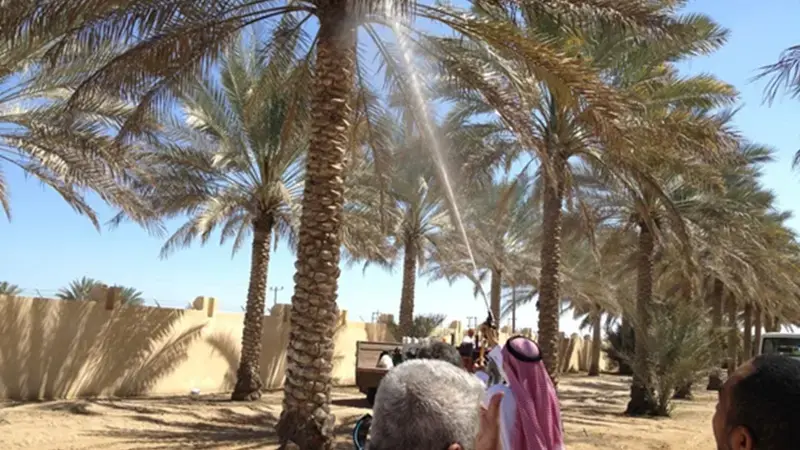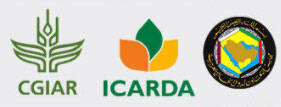Cost-Effective Liquid Pollination Technology for Date Palm Production

- Abdoul Aziz Niane - Regional Coordinator APRP
- Boubaker Dhehibi - Senior Natural Resources Economist
An ICARDA-led, GCC-funded date palm research and development project introduces Omani farmers to the liquid pollination technique of date palm trees for more efficient and profitable production.
Thirty-nine countries around the world produce dates and 90 percent of all production are concentrated in the hot, dry climate of the MENA region. In the Arabian Peninsula, date palm is one of the most widely cultivated crops, attaining great economic, cultural, social, and religious importance. The total number of date palm trees in the Sultanate of Oman - the eighth largest world producer of dates - is estimated at eight million, which occupies about 49% of the total area under cultivation and 85% of the area cultivated by fruit trees.
Yet climate change has not spared the date palm tree. Spiking temperatures, increasing water scarcity, frequent droughts, fierce winds, and the spread of insect pests such as the red palm weevil, are threatening its productivity. The date palm industry also suffers from weak post-harvest handling and storage, a nascent but fragile value chain/market for palm by-products (fibers, wood), and a lack of technical expertise and linkages between the value-chains key actors. ICARDA’s close research collaboration with NARS partners is now changing this.
The date palm tree is a dioecious plant, and its pollination is essential for optimal production. Date-producing farmers usually apply a conventional pollination process by hand, requiring to climb each plant tree during the pollination season to spread the pollen grains from the male flower into the female cluster and repeat the operation three times to guarantee successful pollination. Pollination by hand is expensive, time-consuming, labor-intensive, and not risk-free, since for average date palms farmers have to climb up to 21-23 meters and stay there for some time.
Within the framework of the ICARDA-led research project funded by the Gulf Cooperation Council (GCC), "Development of Sustainable Production Systems for the Date Palm in GCC," a number of consecutive field experiments were conducted in different agro-ecological zones in Oman on date palm to standardize a new liquid pollination technique. Liquid pollination involves drying pollen grains, creating a mix of 0.5-1 gm of pollen to one liter of water, and then spraying date palm trees with the mixture from ground level with standard jet equipment.
Liquid pollination:
-
Reduces labor cost and improves the effectiveness and productivity of the used labor.
-
Minimizes the quantity of pollen needed for successful pollination.
-
Reduces the risk of pollination during the peak period of flowering.
-
Lowers pollen harvesting losses.
-
Avoids the risk of climbing accidents.
After comprehensive tests to establish the optimal pollen/water mix ratio, ICARDA and NARs partners demonstrated the technology to farmers. Following its success, it was scaled out to various agricultural governorates in Oman by agricultural extension specialists through a series of training workshops and field days.
-------------------------------------------------------------------------------------
IMPACT
Based on the data collected from researchers at the Date Palm Research Center in Wadi Quriyat in Oman:
-
An increase in the value of production of about 20% from using liquid pollination rather than the manual pollination
-
The net return for Omani farmers using LP was US$ 6738/hectare, the benefit-cost ratio is three times higher, and an annual rate of return for about 12%.
-
Liquid pollination improves efficiency, reducing variable costs by about 80% for the same fruit set rate.
-
The reduction in pollination costs (more trees per hour) is about 89% compared to manual pollination.
-
Consequently, a reduction in the total variable costs per hectare versus those for manual pollination is around 57%.


Further Reading:
Youssef Al Raisi, Mohamed Ben-Salah, S. Al-Sabahi, Suleiman Al Amri, Ibrahim Al Bousaidi, Boubaker Dhehibi. (21/3/2018). Liquid Pollination Technology as New Technology to Ameliorate Date Palm Pollination and Facilitate Date Palm Field Operations. https://repo.mel.cgiar.org/handle/20.500.11766/9858
Boubaker Dhehibi, Aden A. Aw-Hassan. (1/10/2016). Economic comparison and evaluation of manual and liquid pollination methods of date palm trees in the Sultanate of Oman (varieties Fardh and Khalas). Amman, Jordan: International Center for Agricultural Research in the Dry Areas (ICARDA). https://repo.mel.cgiar.org/handle/20.500.11766/6257
Mohamed Ben-Salah, Youssef Al Raisi. (6/11/2018). Liquid pollination: New field technique to enhance the date palm production. Beirut, Lebanon. https://repo.mel.cgiar.org/handle/20.500.11766/9973
